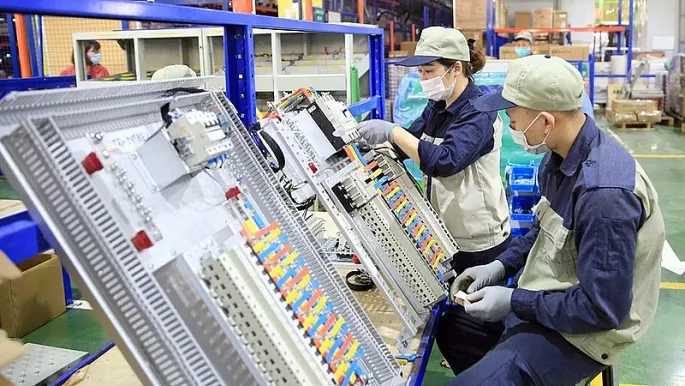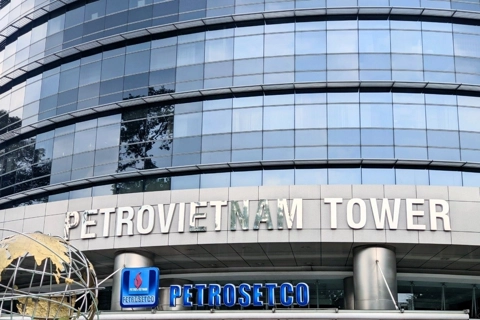Vietnam's industrial production set for positive growth in 2025: S&P
Firms maintained an optimistic outlook for production over the coming year, with sentiment recovering from the 19-month low posted in December.
Vietnam’s industrial production is projected to have a 4.6% growth rate in 2025, with manufacturers hoping for improving conditions compared to the end of 2024, said Economics Director at S&P Market Intelligence Andrew Harker.
| Electronics production at Quat Dong Industrial Cluster in Thuong Tin District, Hanoi. Photo: Dang Anh/The Hanoi Times |
Harker suggested that early-2025 subdued demand conditions are causing Vietnamese manufacturers to experience renewed declines in both new orders and output, along with more pronounced employment cuts.
“There was some respite on the price front, however, with slower cost inflation enabling firms to reduce their own selling prices in order to boost demand,” he said.
In particular, more than 36% of respondents predicted a rise in output over the next 12 months, linked to hopes of a recovery in market demand. PMI is compiled by S&P Global from responses to questionnaires sent to purchasing managers in a panel of around 400 manufacturers.
In January, the PMI posted 48.9 in January, down from 49.8 in December and below the 50.0 no-change mark for the second successive month. A reading below the 50 neutral marks indicates no change from the previous month or even contractions; above 50 points means an expansion.
The deterioration in operating conditions was modest, but slightly more pronounced than was the case in the previous survey period. New orders decreased for the first time in four months during January amid reports from panelists of subdued customer demand.
The drop in total new business in part reflected a reduction in new export orders, which decreased for the third month running. The reduction in new orders fed through to a fall in production, also for the first time in four months. As was the case with new business, however, the rate of decline in output was only slight.
According to S&P Global, falling new orders meant that there was a degree of spare capacity in the Vietnamese manufacturing sector. Firms were therefore able to deplete backlogs of work for the first time in eight months. Manufacturers also continued to scale back employment, with staffing levels down for the fourth consecutive month.
Moreover, the rate of job shedding was solid and the most pronounced since May last year. On the other hand, purchasing activity increased, albeit marginally. Respondents indicated a desire to make sure that sufficient inputs were secured to support production needs. Firms continued to face delays in securing materials, with suppliers' delivery times lengthening for the fifth month running. Slow transportation and higher shipping costs were behind longer lead times, according to panellists.
The rate of input cost inflation slowed in January and was the weakest in the current 18-month sequence of rising input prices.
The increase was also below the series average. Where input costs did rise, firms linked this to higher prices for raw materials and transportation. Softer cost inflation gave manufacturers the room to lower their selling prices in a bid to boost fragile customer demand. Output prices decreased for the first time in nine months, albeit marginally. Firms maintained an optimistic outlook for production over the coming year, with sentiment recovering from the 19-month low posted in December.
Manufacturing output slowed last month for two main reasons. First, the 2025 Lunar New Year holiday, with nine official days off starting January 25 and lasting until February 2, led most businesses to reduce production in the latter half of the month as they prepared for the year-end closing.
In addition, Vietnam's production slowdown follows a broader trend in Asia, where interconnected supply chains depend on consumption patterns in both the West and China. Last month, China's manufacturing PMI, reported by Caixin/S&P Global, fell to 50.1 from 50.5 in the previous month—the lowest in four months. In Japan, the PMI surveyed by Jibun Bank dropped to 48.7, lower than its year-end level and remaining below the 50 threshold for seven consecutive months.












